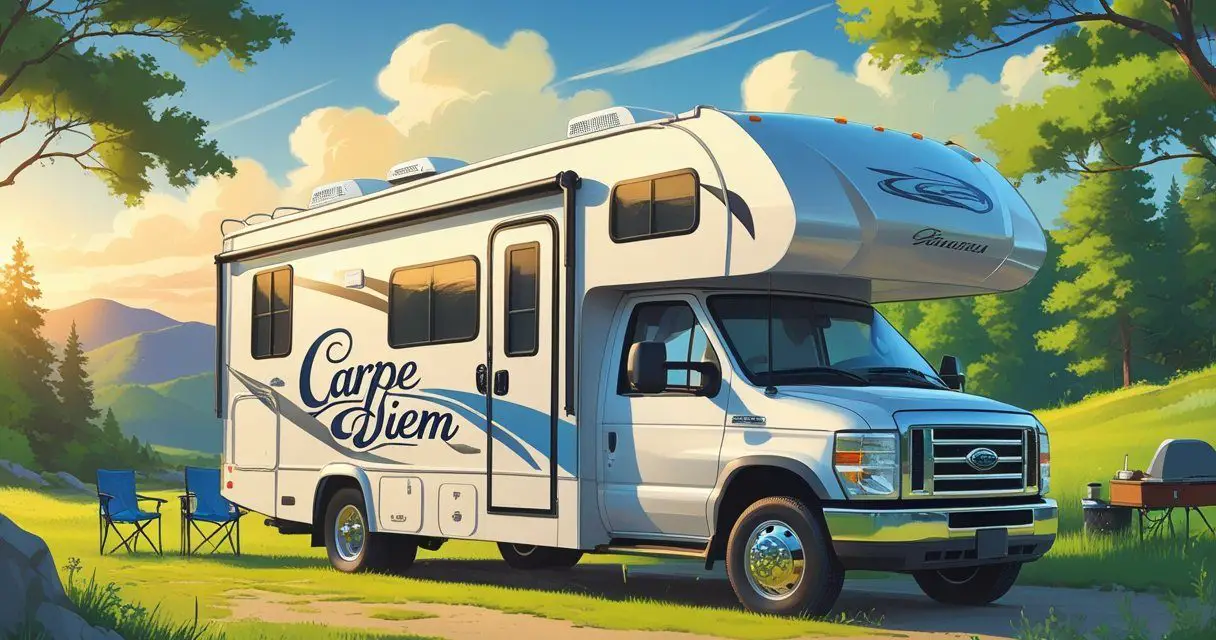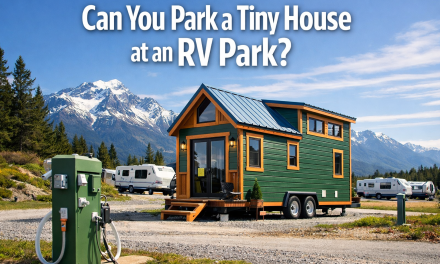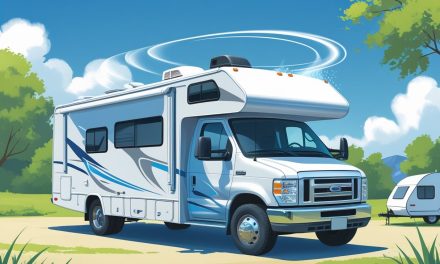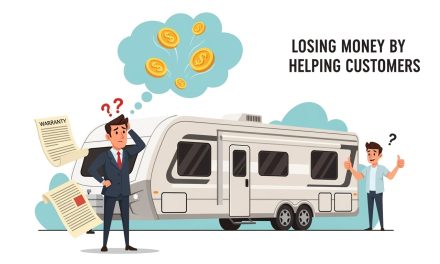You’ve seen it everywhere—on coffee mugs, throw pillows, and maybe even tattooed on someone’s arm. “Carpe Diem” or “Seize The Day.” It sounds perfect for the RV lifestyle, right? Pack up, hit the road, and live your dreams!
But hold on a second. There’s more to this famous saying than most people know. And if you’re thinking about buying an RV, you need to hear the whole story before you sign anything.
The RV Wingman recently dropped some serious wisdom that could save you from joining the estimated 70% of RV owners who regret their purchase. Yes, you read that right—70%! That’s a lot of unhappy campers out there.
Would you like to save this article?
Let’s dive into what “Carpe Diem” really means and how it applies to your RV dreams. Spoiler alert: it’s not just about being spontaneous—it’s about being smart.
1. “Carpe Diem” Doesn’t Mean What You Think It Means
Here’s something your high school Latin teacher probably never told you: “Carpe Diem” is only half the quote! The full phrase from the Roman poet Horace actually says: “Carpe diem, quam minimum credula postero.”
Translation? “Seize the day, and trust as little as possible in tomorrow.”
That second part changes everything, doesn’t it? It’s not telling you to be reckless. It’s telling you to take action while being prepared for what might go wrong. Think of it as packing a parachute before you jump.
Why This Matters for RV Buyers: According to RV Travel, a whopping 70% of RV owners experience buyer’s remorse. The biggest reasons? They rushed into purchases without doing proper research, bought the wrong type of RV, or didn’t understand the true costs of ownership.
| Common RV Purchase Regrets | Percentage |
|---|---|
| Wrong RV Type | 18% |
| Bought Too Large | 5% |
| Rushed Decision | Multiple reports |
| Underestimated Costs | 34% |
Source: RV Show Off Poll Results and RVIA 2025 Owner Demographics
Here’s the Truth You Need to Hear: You can’t just show up at a dealership on Saturday morning, sign papers by lunchtime, and expect happily-ever-after. If you do, you’ll probably end up with a rig that leaks, a payment plan that crushes your budget, and a service department that ghosts your calls faster than a bad Tinder date.
2. Do Your Homework Like Your Happiness Depends On It (Because It Does)
The RV Wingman puts it perfectly: “Seize the day, but do it with a map in one hand and a flashlight in the other.” That means you need to do your research before anyone pressures you into a sale.
Here’s what “doing your homework” actually looks like:
- Ask questions (lots of them)
- Read the fine print on contracts
- Sleep on it before making decisions
- Check dealer reviews on sites like RV Service Reviews
- Understand maintenance costs
Real Talk About RV Costs: Most first-time buyers only think about the purchase price. But according to Cruise America, RV owners should budget between $1,000 to $2,000 per year just for repairs and maintenance. Some years it could be way more if something major breaks.
A study featured on RV Love tracked one couple who spent $23,268 in repairs and maintenance over 27 months—that’s $862 per month! For just repairs! On top of their RV payment!
Reality Check Time: If you walk onto a lot without doing your homework first, you’re basically showing up to a knife fight with a pool noodle. Those salespeople? They’ve been trained to spot eager dreamers from a mile away. And they know exactly how to turn your “just looking” into a “just signed” before you can say “slide-out mechanism.”
3. Don’t Let Anyone Rush You (Especially Salespeople)
Here’s a golden rule from the RV Wingman: “Don’t let anyone rush you. Especially not the guy selling you something as expensive as an RV.”
Dealerships love to create urgency. They’ll tell you things like:
- “This deal ends TODAY!”
- “Someone else is looking at this RV right now!”
- “The price will go up next week!”
- “You’ll regret it if you wait!”
But here’s what they won’t tell you: There will always be another RV. There will always be another sale. And rushing into a six-figure purchase is the fastest way to become part of that 70% regret statistic.
Consider This: News reports have documented numerous cases where major RV dealers sold units with undisclosed problems, and customers spent months waiting for repairs. One investigation found customers complaining about dealers selling RVs in poor condition while pressuring buyers to close deals quickly.
The Brutal Truth: When a salesperson says “this deal won’t last,” what they really mean is “I need to hit my quota before my manager yells at me again.” Your life-changing decision is just another notch on their monthly sales board. So when they start doing the whole “act now or lose out forever” routine, just remember: desperation is a two-way street, and it’s usually flowing from their direction.
4. Once You Sign, You Own It All—The Good, The Bad, and The Leaky
The RV Wingman drops this truth bomb: “Once you sign on the dotted line, once you roll off the lot, you own what you seize—the good, the bad, and the maintenance schedule, too.”
This is huge. Unlike buying a car, RV lemon laws vary wildly by state. And many dealers have limited or no return policies. Once you drive it home, that’s your problem now.
What You’re Actually Buying:
| Hidden RV Ownership Costs | Annual Estimate |
|---|---|
| Maintenance & Repairs | $1,000 – $2,000+ |
| Insurance | $1,000 – $4,000 |
| Storage (if needed) | $600 – $3,600 |
| Campground Fees | $3,000 – $15,000 |
| Fuel | Varies widely |
| Registration/Taxes | $100 – $1,000+ |
Sources: Outdoorsy, RVshare, Bish’s RV
According to RVIA data, 34% of RV owners say the cost of ownership was more than expected, while 31% complain that the amount of time needed for service is excessive.
Let’s Be Real Here: Buying an RV is like adopting a very expensive, very high-maintenance pet. Except this pet is made of fiberglass and aluminum, weighs several tons, and has approximately 47,000 things that can (and will) break at the worst possible moment. You can’t just feed it and take it for walks. You’re signing up for a relationship that requires constant attention, regular checkups, and an emergency fund that would make a cardiac surgeon jealous.
5. Problems Don’t Need a Forwarding Address—They’ll Find You Anywhere
Here’s a dose of reality from the RV Wingman: “Problems don’t need a forwarding address. They will find you.”
A lot of people think buying an RV will solve their problems. They imagine escaping stress, drama, or daily responsibilities. But here’s the thing: you can’t outrun yourself.
Financial problems? They follow you into campgrounds. Relationship issues? They get worse when you’re stuck in 200 square feet together. Work stress? It doesn’t magically disappear just because you have a better view.
Plus, RVing Creates New Challenges:
- Mechanical breakdowns in remote locations
- Weather emergencies (hurricanes, floods, extreme heat/cold)
- Finding safe parking/camping spots
- Dump station disasters (if you know, you know)
- Internet connectivity issues for remote work
- Healthcare access when you’re constantly moving
Financial Reality Check: Financial expert Dave Ramsey strongly warns against financing depreciating assets like RVs. According to Yahoo Finance, Ramsey states: “Cars, trucks, RVs, boats, and everything that has motors and wheels go down in value. NEVER finance them, because they go down in value and you get stuck in them.”
Many RV buyers find themselves severely upside down on loans, owing far more than their RV is worth within just a few years.
The Uncomfortable Truth: RVing isn’t a magic reset button for your life. If you’re running from something, you’ll just end up cramped, broke, and uncomfortable in a new location. But if you’re running toward something—adventure, freedom, new experiences—and you’ve prepared properly, then you might actually find what you’re looking for. The difference between those two scenarios usually comes down to whether you took the time to really think things through before you signed that paperwork.
The Bottom Line: Own What You Seize
The RV Wingman’s message isn’t about scaring you away from RVing. It’s about waking you up before you make a decision you can’t undo. RV life can be absolutely incredible—full of freedom, adventure, and unforgettable moments by the campfire.
But only if you do it right.
So yes, seize the day. Chase your RV dreams. But do it with your eyes wide open, your research done, and your parachute packed. Because the real “Carpe Diem” isn’t about being fearless—it’s about being prepared.
As the RV Wingman says: “If you’re awake, you won’t miss what is real. You’ll see the snake oil for what it is. You’ll see the slime balls for who they are.”
And maybe, just maybe, you’ll find that peace in a folding chair aside a quiet lake at dusk. That’s worth seizing.
SOURCES
- RV Wingman – “Carpe Diem Gone Wrong: The Truth RV Dreamers Need to Hear Before They Buy”
- RV Travel – “RV buyer’s remorse: Why 70 percent of RVers regret their purchase”
- RV Show Off – “What’s Your Biggest RV Purchase Regret? RVer Poll Results Unveiled”
- RVIA – “2025 RV Owner Demographic Profile Overview”
- Cruise America – “RV Ownership Costs: What is the Yearly Total?”
- RV Love – “The Real Cost of RV Ownership: Here’s What We Spent”
- Outdoorsy – “The Hidden Costs of RV Ownership”
- RVshare – “Complete Guide to RV Ownership: Costs, Maintenance, Value”
- Bish’s RV – “The Hidden Costs of RV Ownership — What No One Tells You Until It’s Too Late”
- Yahoo Finance – “Dave Ramsey Warns Against Financing Cars, Trucks, RVs And Boats”
- Live 5 News – “‘So many lies’: North Charleston Camping World accused of poor operations”
- John Marucci – “The Real $$ Cost of RV Ownership – 5-Year Analysis”
- Consumer Affairs – “RV Ownership Statistics 2025”







